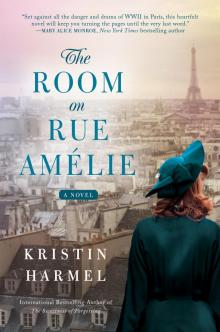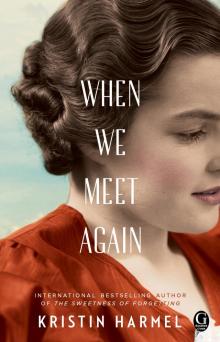- Home
- Kristin Harmel
The Winemaker's Wife Page 3
The Winemaker's Wife Read online
Page 3
And so, despite her hammering heart and clammy palms, Céline smoothed back her hair and forced a smile. She was already dressed for the day in dungarees and work boots, a white cotton blouse buttoned over her camisole. She had planned to accompany Theo to a nearby vineyard to inspect some of the early buds, though it was clear that would have to wait. “Very well,” she told Theo. “Let’s go.”
He grasped her hand, squeezing her fingers too hard, and pulled her out the door. Down the lane, maybe a half mile away, Céline could see a small caravan of military trucks, dust swirling around them as they approached. The hum of their engines cut through the afternoon stillness, a low and insistent buzz of warning. “Merde,” Theo muttered. “They’re here sooner than I thought they’d be.”
Theo and Céline ran to the main house. The door was already open, Michel and Inès waiting for them just inside, their faces pale. “What will we do?” Inès asked as soon as they entered. For once, she looked undone, her dark auburn hair swirling untamed and wild. She was in black T-strap heels and a long blue dress with a fitted waist, somehow still delicately pretty in the midst of all the chaos. Inès looked from Theo to Céline and then back to Michel. “We have to do something!” She put her palms on her cheeks and then ran her nails down the lengths of her arms, as if she didn’t know what to do with her hands.
“We wait,” Michel said, closing the door. The dark stillness of the front hall engulfed them. “We wait, and we see what they want.”
Less than a minute later, after the squealing of brakes and a cacophony of rough laughter and deep voices outside, there was a heavy knock on their front door.
“Calm,” Michel reminded them, and then he swung the door open to greet their invaders. Céline could see three German soldiers, all in full uniform, two toting long rifles, standing on the step, and behind them, a half dozen more. They were young, perhaps in their early twenties, except for the broad-shouldered man in front, who appeared to be closer to forty. His hand hovered over the holstered pistol at his hip.
“Hello,” Michel said evenly, as if answering the door to Germans was an everyday occurrence. “How can we help you?”
“Help us?” The older man snorted. “You can help us by showing us where the entrance to your champagne cellar is.”
Michel didn’t reply right away, and in those frozen few seconds, Céline studied the man. He was tall, dark-haired, with a narrow mustache, small eyes, and refined, almost elegant features that were currently arranged in a sneer. His forest green uniform jacket with its rigid black collar was cinched with a brown leather belt and adorned with bronze buttons, medals, and a Nazi insignia. His pants were gray, and below them, his black jackboots gleamed in the sunlight. Despite the heat of the morning, there wasn’t a single crease on him. He was an officer, she realized, in charge of the others. His French was perfect, hinting at some level of education and grooming.
“Certainly,” Michel replied evenly. “Might I ask what you’re looking for?”
“You may not.”
Michel and Theo exchanged looks, and then Michel stood back, ushering the soldiers inside as if they were honored guests. He led them through the house and out the back door, and it was only then that Céline realized that the small secondary entrance to the cellars, the one Michel’s great-grandfather had installed in the kitchen in case the family needed a quick route to the cellars, had been hidden behind a large armoire. Instead, Michel—with Theo a few steps behind him—seemed to be taking the soldiers to the main entrance in the stone wall that separated their garden from the vineyards beyond. When Michel’s great-great-grandfather had constructed the elaborate tunnels to rival the crayères of the larger champagne houses, he had also installed an imposing entryway made of stone, closed off by an ornately carved wooden door so it looked as grand as possible. “Stay here,” Michel warned over his shoulder, looking first at Inès and then at Céline.
But the officer placed a firm hand on Michel’s forearm and glanced back at the women. He smiled, and there was something about the expression—cold and lupine—that chilled Céline to the bone. “No,” he said, “I think the women will come with us, too.”
Céline didn’t resist when Inès grabbed her hand, lacing her tiny, childlike fingers through Céline’s longer, narrower ones. Together they followed their husbands through the imposing cellar door and down the narrow steps, their hurried footsteps clicking on the stone like the insistent tap of woodpeckers. One of the soldiers whistled in appreciation as the first cave full of bottles came into view, but the man behind him nudged him and said in German, “Oh, come on now, this is nothing compared to Veuve Clicquot Ponsardin.”
Céline understood, because her mother, who had grown up near the German border, had taught her German at home when she was a girl. But she played dumb, keeping her eyes wide and her expression neutral. She knew that she was at an advantage, however little it might be worth, if the Germans felt they could speak openly in front of her.
“Well? Where are your 1928s?” the officer asked, looking around suspiciously. “And your thirty-fours?”
“We have only a hundred odd bottles left of each vintage.” Michel met the officer’s gaze. “But if you’ll follow me, they’re just this way.”
The officer narrowed his eyes, but he allowed Michel to lead the group down the main tunnel to a cave on the left, where Céline knew Michel had deliberately left out a few racks of the best wines. A total absence would be suspicious; a shortage could be explained by saying that the remaining bottles had sold. “Here we are,” Michel said, waving his arm toward the room. “Just on the floor there to the right.”
“Hmph.” The officer beckoned one of his men, and together they lifted up one of the crates and pulled a bottle out. It was indeed a twenty-eight, one of the most valuable of their collection. Behind the Virgin Mary nestled into the curve of the hall, its sisters lay silently in wait. “Where are the rest?” the officer asked, turning to Michel, his expression hard, his right hand drifting toward his pistol again.
“Oh, we’ve been nearly sold out for a long time. Twenty-eight was a very good year, you know. Very in demand. Thirty-four, too.” Michel furrowed his brow. He was a far better actor than Céline had realized. “Please. Take what we have. You’ll have no quarrel from me.”
The officer gestured to two of his men, who scrambled to begin grabbing bottles. “That will do. Now leave us to it.”
“Certainly.” Michel took Inès’s hand and began to walk briskly back toward the stairs. Céline and Theo followed. The four of them were silent until they’d made their way back upstairs, across the back garden, and into the kitchen of the main house.
“Michel, you practically thanked them for looting our cellars!” Inès cried as soon as they were alone.
“What is it I should have done, Inès?” Michel sounded weary. “It’s anarchy out there. We have to plan for the future, and if they think we’re hiding something, they’ll tear our caves apart.”
“But did you have to be so . . . submissive?” Inès demanded, her voice raising an octave in indignation. “This is our property!”
“Inès!” It was the first time Céline had heard Michel raise his voice. He raked his hand through his hair as Inès blinked at him like a wounded doe. “Darling,” he said more calmly. “This is the worst of it. We wait out this storm, and the German authorities will be in control of their men in a few days. Until then, we just have to survive.”
Inès opened her mouth to reply, but she was interrupted by a voice behind them. “It seems you French are wiser than you look.” They all whirled around and saw the German officer framed in the sunlit back doorway, a cigarette in his hand trailing a sinewy ribbon of smoke. “Your only job now is to get by. Verstanden?”
No one answered, so after the silence had ticked on for too long, Céline replied for all of them. “Yes, sir. We understand. You’ll have no trouble from us.”
The officer smiled slightly, which made him look even more dangerous, m
ore sinister. Or maybe it was just the way he was suddenly studying her that was so unsettling; it was as if he was noticing her for the first time. His gaze lingered on the top buttons of her blouse. She resisted the urge to flinch, to cower, and finally, his eyes traveled back up to her face. “I’m glad to hear it,” he said.
Céline swallowed hard as the officer turned his attention back to Michel. “Now. What is in that smaller house?” He gestured toward Céline and Theo’s cottage. “My men wish to see.”
• • •
An hour later, both homes had been emptied, along with dozens of cases of the Maison Chauveau’s best champagne. Michel had insisted they all remain passive as the Germans grabbed furniture, ripped generations-old tapestries from the walls, raided their pantries, and carried out precious loaves of bread, jars of jam, cans of coffee. The Germans took everything—armchairs, blankets, mattresses—even the old grandfather clock that had stood watch for more than a hundred years in the parlor. They piled it all in the garden outside the main house, crushing the bed of red peonies Inès had stubbornly tended even after Michel had insisted they’d need to convert all remaining tillable soil to vegetable gardens. It was a moot point now.
Atop the pile, Céline saw the faded quilt her mother had made her to celebrate her marriage to Theo, and she felt suddenly furious. What would these men need with something so personal? It was the middle of June; the nights were warm enough. No, the quilt represented something worse—a need to plunder for the sake of plundering. She blinked back tears; she knew she should be more concerned about the loss of furniture, of canned and jarred food that would have taken them through the winter. But the quilt was one of the last things she had to remind her of her mother.
The men poured out from the houses, having finally taken everything of any conceivable value. As the men loaded up the trucks, the officer in charge strolled over, his thumbs hooked in his belt.
“We will be back for more champagne when we need it.” There were crumbs on his mustache, a smear of jelly on the right side of his chin. “All you have belongs to Germany now.”
Michel coughed and pressed his lips into a thin line.
The officer studied him. “Wir werden uns wiedersehen,” he said, his tone menacing. No one responded, and he looked amused by their lack of understanding. Céline made sure to keep her expression neutral, and when the officer’s gaze landed on her again, lingering for long enough that she could feel Theo tensing beside her, she forced herself not to blink, not to flinch, until he finally turned on his heel and strode off.
And then, as quickly as they had arrived, the Germans clambered back into their trucks and pulled away with their spoils, hooting and hollering until they were out of sight.
“What did he say?” Inès asked, her tone bordering on hysterical, once the convoy was finally gone. The sudden silence felt ominous. “Does anyone know what he said?”
“He said we will meet again,” Céline replied. There was no need, though, to translate the intent behind the words. They were a threat, and even in the heat of the warm Champagne sunshine, Céline’s blood felt like it had turned to ice.
five
JUNE 2019
LIV
“You need to snap out of it,” Grandma Edith said as Liv stared out the window at the dark sky over the Atlantic, wondering when she’d see the first rays of dawn over the eastern horizon.
Liv turned, surprised to see her grandmother sitting up, studying her in the muted lighting of their first-class cabin. They had boarded the Delta flight hours ago, but Liv hadn’t been able to sleep, despite the fact that the lay-flat premium seats were even more comfortable than Liv had imagined they’d be.
“I didn’t know you were awake, too.” Liv put a hand on her grandmother’s arm. It was cold, covered in goose bumps, and Liv instinctively reached for the blanket that had slipped to her grandmother’s lap.
“Leave it,” Grandma Edith said, pushing Liv away. “I’m fine. But you aren’t. You’re wallowing.”
“I’m not wallowing. I’m just sad.”
“About that good-for-nothing Eric?”
Liv picked at her thumbnail. “About the fact that I don’t even know who I am anymore.”
“Oh for God’s sake, Olivia, I hope you’re not telling me that you had your identity tied up with that good-for-nothing. I know that after your father died, your mother went through husbands like other people go through cartons of milk, but I thought you were better than that.”
Liv gave her a look. “I just meant that this whole thing blindsided me, and now I feel a little lost, okay? I’m forty-one with no husband, no kids, and no job. It’s not where I thought I’d be.”
“Yes, well, if you let Eric take everything from you, then he wins, doesn’t he?” Grandma Edith shook her head and pushed her call button. “And that would be a disappointment indeed.”
Liv chewed her lip as a flight attendant approached, her mascara smudged, her hair flattened on one side. She’d clearly been sleeping, but Grandma Edith didn’t seem to care as she crisply ordered a gin martini and some pretzels. The flight attendant delivered the order a moment later with a yawn and shot Liv a questioning look. Liv could only shrug. No one ever seemed to know what to make of the diminutive French nonagenarian who drank like a 1960s advertising executive.
“Now, where were we?” Grandma Edith asked after she’d taken a long sip of her cocktail, her third since boarding. Clearly the secret to the old woman’s longevity was an unwavering commitment to pickling her liver. “Oh yes, your malaise. It’s not terribly becoming, dear. My mother always said that a lady should find a way to solve her problems without complaint. I think that was very good advice, though I admit I didn’t always adhere to it.”
“With all due respect, Grandma Edith, maybe your mother never had to deal with infertility and a husband who couldn’t stand the sight of her anymore.”
“No, dear, she only had to deal with the violent death of her brother in the First World War, terrifying nightly bombings while the Germans ransacked France, and my father returned from Verdun half blind and full of misplaced anger.”
Liv stared at her. “Grandma Edith, I’m so sorry. I had no idea your family had gone through all that.”
“Yes, well, some things are best left alone. The point is, many people lose more than they can imagine, and they still find a way to carry on.” When she lifted her martini again, her hand was trembling. She glanced at Liv, and then she looked past her, her gaze very far away. “I found a way, Olivia. And you must, too.”
• • •
Paris was bustling, even though it wasn’t quite eight in the morning as their chauffeured car wove through the narrow streets of the seventh arrondissement. Liv gazed out the window at the boulangeries already crowded with people, the florists just setting up for the day, the fromageries with their displays of overflowing cheeses. Liv cracked the window and breathed in deeply, inhaling the familiar mélange of yeasty bread, faint cigarette smoke, and flowers—a combination that was uniquely Parisian. She had been here so many times as a child that the scent should have triggered happy recollections of running through the Tuileries gardens with her grandmother strolling behind her, a cigarette pinched between two narrow fingers.
Instead, the memory that dug its claws into her was of a more recent trip, one she took with Eric right after he’d proposed thirteen years ago. She couldn’t marry him in good conscience without Grandma Edith’s approval. It was supposed to have been a mere formality, but Grandma Edith had disliked him from the start for reasons Liv couldn’t fathom. Eric hadn’t liked Grandma Edith much, either; he’d told Liv on their first morning there that the old woman seemed too showy.
“I think she just lives comfortably, that’s all,” Liv had protested. “Besides, you know how generous she always is with me.”
Eric had rolled his eyes. “Yeah, well, it must be nice to be rolling in money she didn’t actually earn.”
“What are you talking about? We ha
ve no idea where her money comes from.”
“And you don’t think that’s weird?”
Liv shrugged. “I think it’s old-fashioned. She always says it’s vulgar to talk about finances.”
“Well, regardless, she doesn’t seem to believe I’m worthy of a cent of her fortune.”
“What?”
“You’re going to tell me that having me sign a prenup wasn’t all her idea?”
Of course, it had been Grandma Edith who had insisted on the document, which seemed pointless to Liv. But the older woman was generously paying for their wedding, and acquiescing to the request seemed a small price to pay to keep the peace. “Look, does it matter? It’s not like we’re going to get divorced. I love you.”
Later, when Eric had been in the shower, Liv had broached the subject with Grandma Edith. “You do like him, don’t you?”
It had taken Grandma Edith a long time to meet Liv’s gaze. “No, not particularly.”
“But you barely know him! How can you possibly say that?”
“A lifetime of experience, dear. When you know, you know.”
“Well, you’re wrong! And it’s not your place to be judging the person I love!”
“Someone has to be the voice of reason,” Grandma Edith replied, looking her in the eye. “And your mother is too busy gallivanting around with her boyfriends to say a thing.”
“Maybe she just respects my point of view more than you do.”
“Or maybe she hasn’t realized yet that matters of the heart can make you both blind and stupid.” Grandma Edith shrugged while Liv seethed. “But it’s your life. Marry him if you want. Just don’t say I didn’t warn you.”
Now, nearly a decade and a half later, the words still rang in Liv’s ears. “Grandma Edith?” she asked softly as the car turned right on the rue Fabert and the gold dome of Les Invalides came into view.
“Hmm?”
“How did you see through Eric so quickly when I first brought him here to meet you?”

 The Room on Rue Amélie
The Room on Rue Amélie The Winemaker's Wife
The Winemaker's Wife The Forest of Vanishing Stars
The Forest of Vanishing Stars The Book of Lost Names
The Book of Lost Names Italian for Beginners
Italian for Beginners After
After How to Save a Life
How to Save a Life The Blonde Theory
The Blonde Theory The Sweetness of Forgetting
The Sweetness of Forgetting When We Meet Again
When We Meet Again Life Intended (9781476754178)
Life Intended (9781476754178)